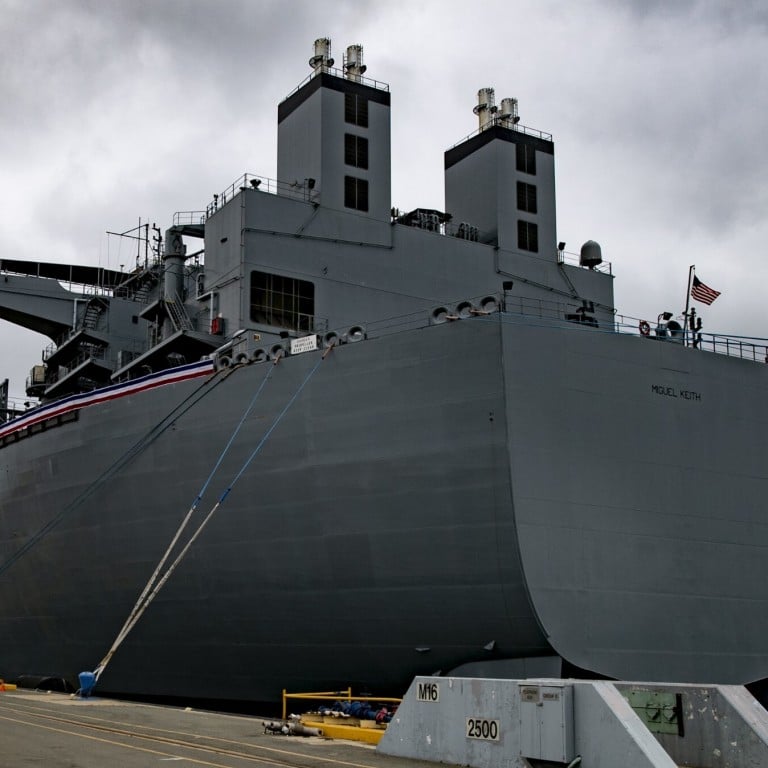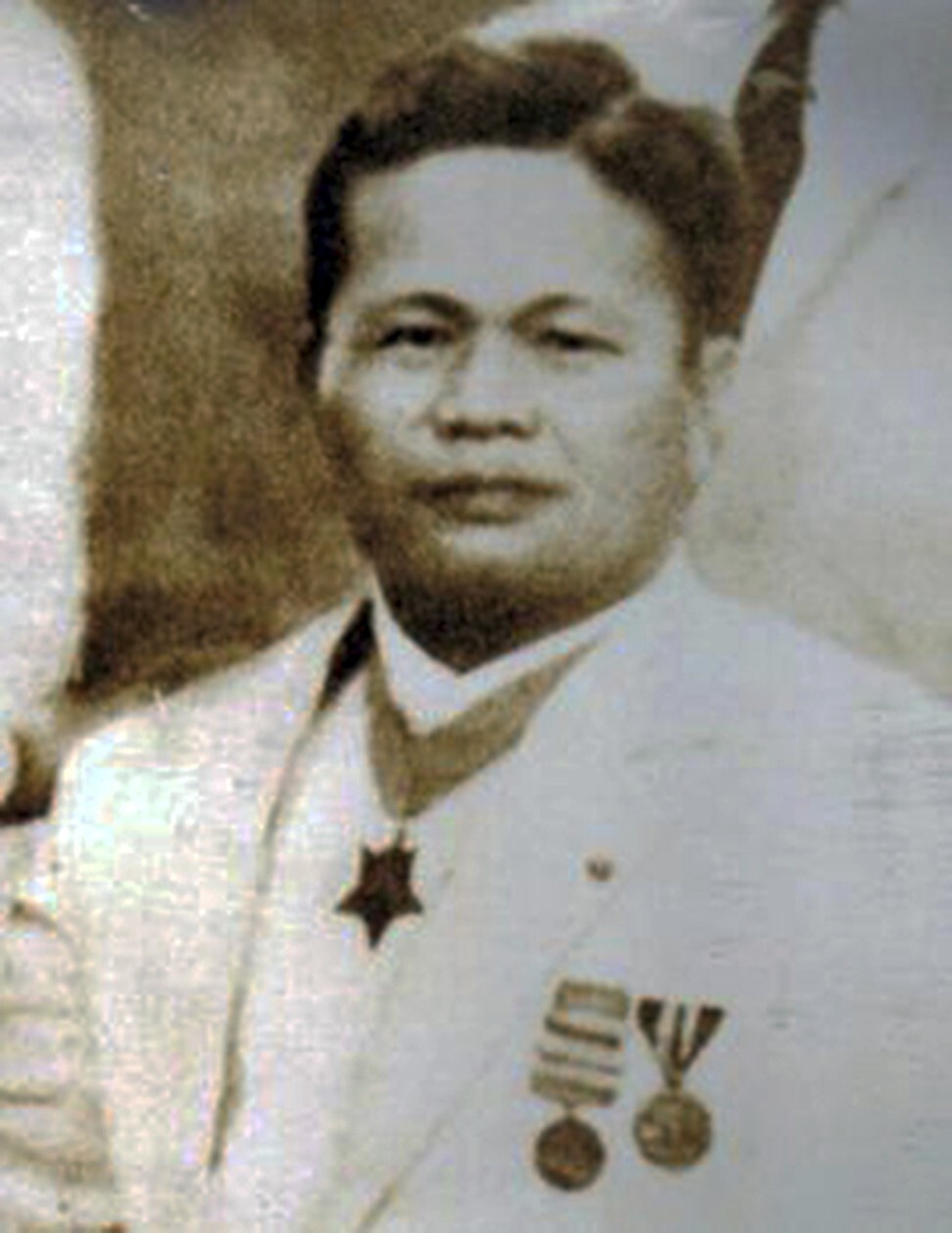
Asian-Americans lobby to name US Navy ship for Philippine sailor Telesforo Trinidad
- Supporters say naming a ship for Trinidad would honour the only Asian-American in the US Navy granted the nation’s highest award for valour
- Tens of thousands of Filipinos and Americans of Filipino descent have served in the US Navy since 1901
“I don’t believe it’s a long shot at all; it may be a long timeline, but we’re hoping it’s not,” said retired Navy Captain Ron Ravelo, the campaign’s chairman. “We’re going to be making Navy ships into the foreseeable future, and there’s no reason one of those can’t bear the name of Telesforo Trinidad.”
Trinidad, who died in 1968 at age 77, was so eager to join the US Navy that he stowed away on a lifeboat from his home island of Panay to the main island to enlist, grandson Rene Trinidad said. In 1915, while on patrol on the USS San Diego, he risked his life and suffered burns to rescue two crewmates when boilers exploded, killing nine. He received the medal that year, at a time when the honour could be awarded for valour outside combat.
Rene Trinidad, a property agent in Southern California, recalls his grandfather was a man of few words.
“He let his actions speak for himself, and I suppose that’s why he did what he did,” he said.

The campaign has grass-roots enthusiasm, and support from Democratic Congress members who sent a letter last month to Thomas Harker, acting secretary of the US Navy.
Traditionally, different types of ships have different naming conventions, but there are exceptions, said Samuel J. Cox, retired rear admiral and director of the Naval History and Heritage Command, which suggests names and has previously submitted Trinidad’s for consideration. The secretary of the navy has final authority and discretion to name and rename ships, he said.
Some memorialise states, US cities, naval heroes or distinguished Americans. The number of US Navy ships receiving names varies widely by year but averages roughly to about eight, of which three or four are named for people, Cox said.
“There simply are far too many heroes compared to the number of ships to be named,” he said.
US-China tensions put Philippines in a tight spot on renewing Visiting Forces Agreement
Norman Polmar, author and naval analyst, agrees.
“And I hate to say this, I’m getting a little pain when I say this: increasingly it becomes political – what party you’re in and who’s in the White House, and occasionally the White House gets involved,” Polmar said.
Former US Navy Secretary Ray Mabus drew controversy after naming naval ships for former US Representative Gabrielle Giffords; the late gay civil rights leader Harvey Milk of San Francisco; and the late farmworker activist Cesar Chavez. The honouring of Giffords broke more modern traditions that the person be dead or old.
Critics also said there were plenty of heroic service members to choose from. Mabus said his picks also showed heroism.
In January 2020, Acting Secretary of the Navy Thomas Modly named a nuclear-powered aircraft carrier after Doris “Dorie” Miller, an African-American enlisted sailor who received the Navy Cross for his actions during Japan’s attack on Pearl Harbour.
The naming did not sit well with critics who say Miller deserves to have a ship named after him, but not an elite aircraft carrier bearing the names of presidents. There is also ongoing debate over ships named for the Civil War Confederacy.
Location of Japanese wartime PM Hideki Tojo’s remains finally revealed
Cecilia Gaerlan, Trinidad campaign board member, said they would like a navy surface combatant, such as a destroyer or frigate, named for the fireman second class. The naming would be a symbol of the US Navy’s commitment to “diversity, equality and inclusion during this time of national racial tensions and unwarranted violence against Asian Americans and Pacific Islanders”, Democratic US Representative Sara Jacobs of California wrote in a letter sent last month to Harker and signed by 10 others.
There are other navy vessels named for Asian-Americans and Pacific Islanders, including the USS Daniel Inouye, a destroyer. The former US senator received the Medal of Honour as part of the celebrated 442nd Infantry Regiment, made up of Americans of Japanese descent whose families were incarcerated in camps during the second world war.
There was a US Navy ship named for a Filipino person, but Gaerlan says the USS Rizal, a destroyer in service from 1919 to 1931, was donated by the Philippine Legislature and honours José Rizal, a national hero who never served in the military.
More than two dozen Asian and Pacific Americans have been awarded the Medal of Honour since its creation during the Civil War, mostly in the US Army, according to the Congressional Medal of Honour Society. There are roughly 3,500 recipients.
Telesforo Trinidad, born in 1890, enlisted in 1910 in the Insular Force established by then-president William McKinley and served in both world wars. More than 250,000 Filipino soldiers served in World War II, and thousands died during the brutal 1942 Bataan Death March in the Philippines.
Rene Trinidad, 65, said it goes against his cultural upbringing to call attention to his grandfather’s heroism, but his late father wanted the recognition for his father, who overcame hardship, merited a medal and worked hard to provide for his family. Two sons followed him into the US Navy.
“The bottom line is that Filipinos be recognised for their contribution to the United States, and that every Filipino should be proud of that as well,” he said.

